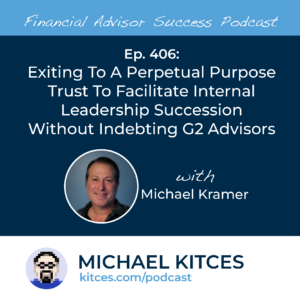 Welcome everyone! Welcome to the 406th episode of the Financial Advisor Success Podcast!
Welcome everyone! Welcome to the 406th episode of the Financial Advisor Success Podcast!
My guest on today’s podcast is Michael Kramer. Michael is the manager of Natural Investments, an RIA based in San Francisco, California that has offices across the country, overseeing $1.9 billion in assets under management for 1,300 client households.
What’s unique about Michael, though, is how his firm used the unique perpetual purpose trust structure to facilitate an internal succession plan, allowing the founding partners to monetize their ownership in the company without indebting the firm’s newer advisors, in the process also creating a more equitable leadership structure based on more than just relative ownership of shares.
In this episode, we talk in-depth about how Michael and his fellow partners used the perpetual purpose trust, which now “owns” the underlying RIA, to implement a succession that provided them with an up-front payment financed by a loan taken out by the business as well as ongoing earn-outs, and allowing them to monetize their original stakes in the firm without putting the firm’s next generation advisors into debt, how Michael’s firm decided to allow new advisors joining the firm to become eligible for its profit-sharing payouts and voting rights immediately (without a vesting period) to further distribute power across the organization, and why Michael’s firm decided to make profit-sharing payouts to advisors on a per capita basis, rather than based on revenue or other metrics, to further help the next generation of advisors build their own practices and economic capabilities for themselves.
We also talk about how Michael’s RIA is now governed by 7 “trust stewards” who are elected by the firm’s advisors who make major decisions for the firm, allowing more of its advisors to participate in decision-making for the firm, the unique “trust enforcer” role that Michael’s firm implemented to ensure its trust stewards have accountability as well, and why Michael and his firm chose the perpetual purpose trust model over others, such as an ESOP conversion or cooperative arrangement, in part based on its structure of having its advisors run their own practices as 1099 contractors rather than as employees of the shared firm.
And be certain to listen to the end, where Michael shares his personal journey of how he built his practice after starting with no clients 24 years ago, in part by public speaking events that helped him gain the trust of prospective clients, how Michael initiates conversations with prospects and clients about their values, which can open the door to discussing how the firm’s socially responsible investing approach can match these values, and why Michael views himself as a “seed planter”, in part by helping to create a business that reflects his values, and is structured to live on after his days as a financial advisor are over.
So, whether you’re interested in learning about using a perpetual purpose trust to drive a succession plan, how this structure can allow founding partners to monetize their ownership without indebting G2 advisors, or how to approach values-based investing conversations with clients, then we hope you enjoy this episode of the Financial Advisor Success podcast, with Michael Kramer.
Leave a Reply